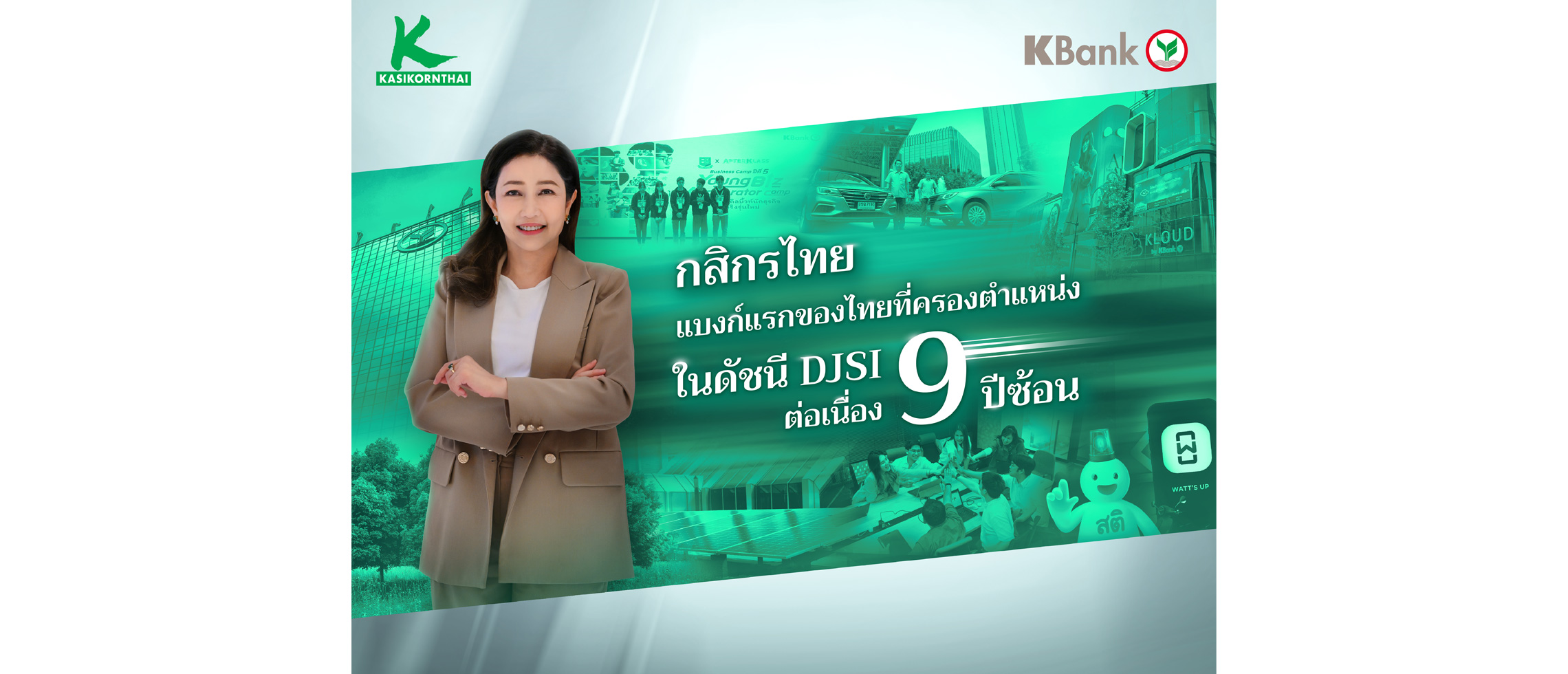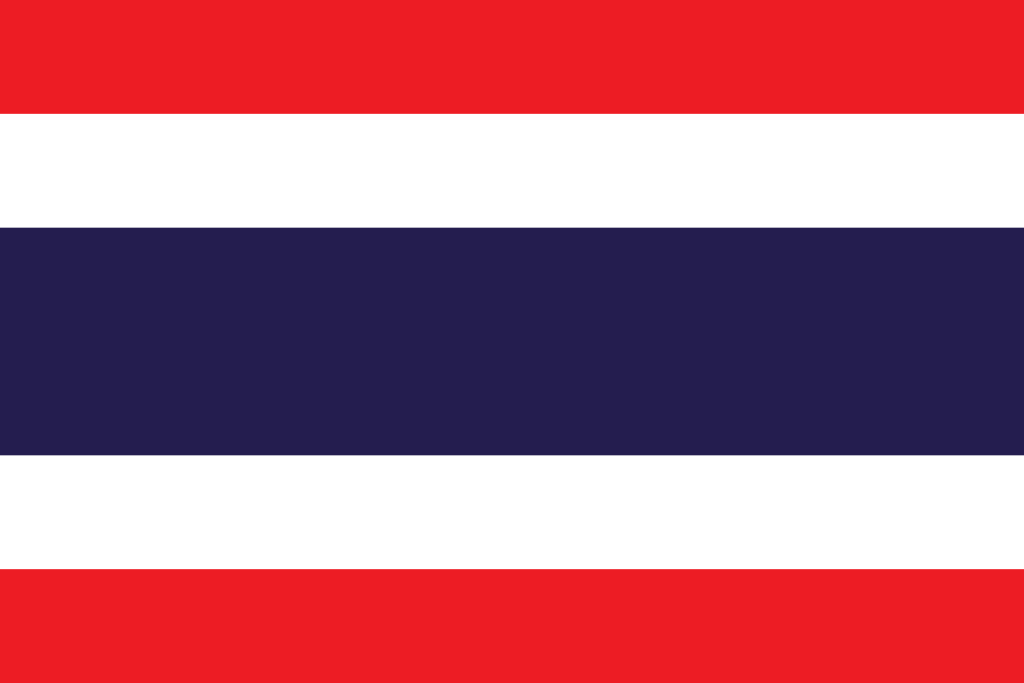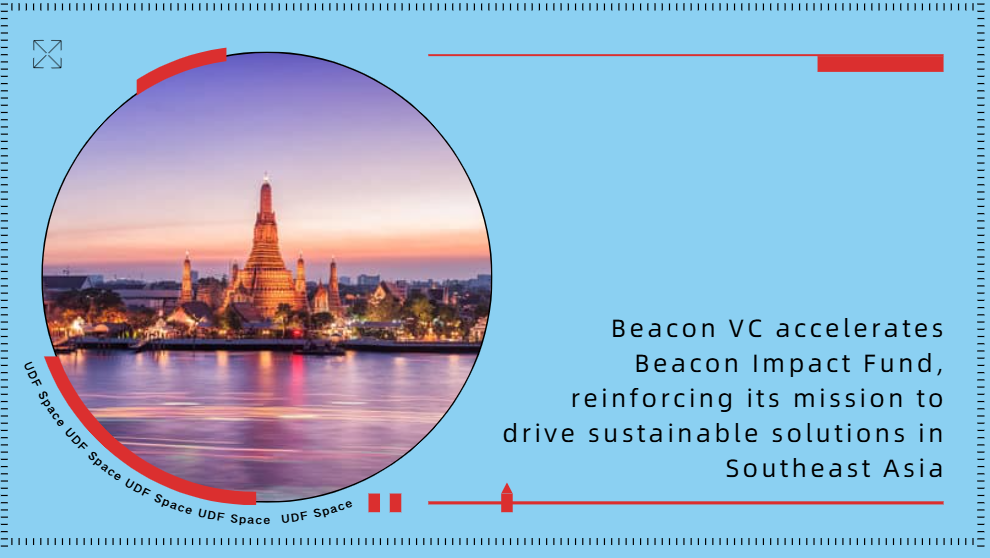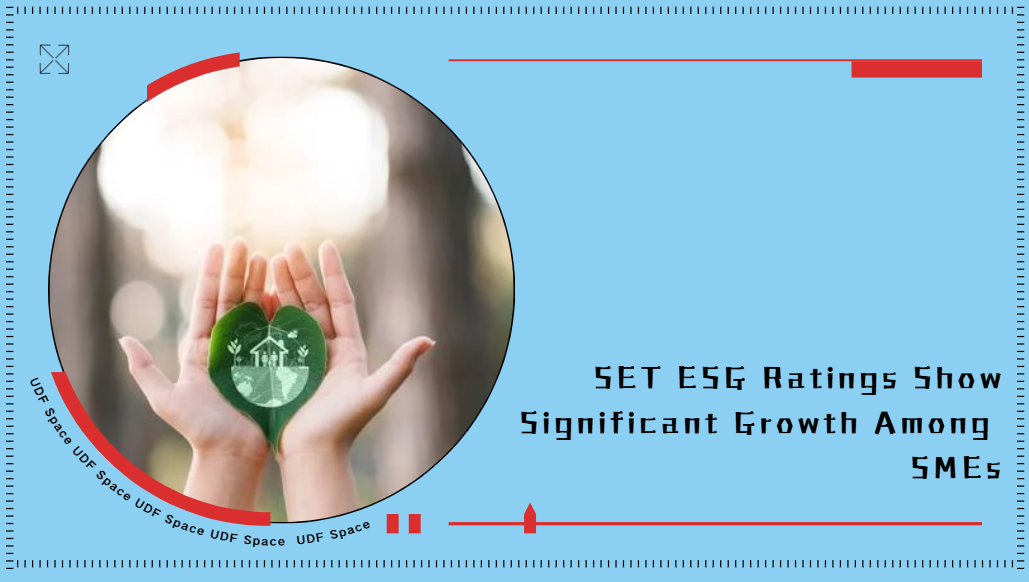KBank maintains its position in globally renowned DJSI for the ninth consecutive year and is the first Thai bank to achieve this milestone
KASIKORNBANK (KBank) has earned a position in the Dow Jones Sustainability Indices (DJSI) 2024 for the ninth consecutive year, and is the first Thai bank to be selected for both the DJSI World and Emerging Markets Indices. The Bank remains committed to connecting with key stakeholders within its ecosystem to deliver sustainable value to all parties.

Ms. Kattiya Indaravijaya, KBank Chief Executive Officer, said, “KBank aims to be a financial institution that advances society towards sustainability. We are committed to being a trusted partner, creating and delivering sustainable value to all stakeholders in accordance with the principles of a Bank of Sustainability. By integrating ESG principles into our operations across all dimensions, the Bank prioritizes environmental stewardship, social responsibility, and market conduct under good corporate governance and effective risk management. To become an ESG leader among Southeast Asian banks, KBank is committed to developing and enhancing our operational standards in alignment with both national and international best practices.
Most recently, the Bank has been selected as a member of the Dow Jones Sustainability Indices (DJSI) 2024, marking its ninth consecutive year (2016-2024) of inclusion in both the DJSI World and DJSI Emerging Markets Indices. KBank is the first Thai and ASEAN bank to achieve this distinction. This recognition reflects the Bank's consistent excellence in environmental, social, governance, and economic performance.
The Bank's key ESG achievements during the past year are as follows:
Environmental aspect: KBank has announced a three-pronged climate strategy, including 1) Green Operation, which aims to reduce greenhouse gas emissions from its operations (Scope 1 and 2) to achieve the Net Zero target by 2030; 2) Green Finance, which focuses on providing loans for and investing in businesses in their transition to a low-carbon society; and 3) Beyond Banking, which includes Climate Solutions (creating solutions for environmental adaptation) and Carbon Ecosystem (connecting carbon ecosystems to address all aspects of the transition), offering more than just financial services.
KBank is working towards its goal of achieving net-zero greenhouse gas emissions from its operations (Scope 1 and 2) by 2030. Between 2022 and 2024, KBank replaced 297 of its ICE (internal-combustion engine) vehicles with electric vehicles and an additional 552 with hybrid vehicles.
Additionally, 100 percent of the main office buildings have been equipped with solar panels, and 83 branch offices have followed suit. KBank has also implemented efficient resource management practices, demonstrating its commitment to environmental friendliness. As a testament to these efforts, KBank has been certified as carbon neutral by the Thailand Greenhouse Gas Management Organization (Public Organization) for seven consecutive years (2018 – 2024).
To achieve its net-zero emissions target within its portfolio (Scope 3), KBank has developed sector decarbonization strategies for six key industries: power generation, oil and gas, coal mining, cement, aluminum and automotive. By working closely with businesses in these sectors, KBank provides tailored tools and solutions to help them adapt to the rapidly changing environment, comply with environmental and sustainability regulations, and seize emerging opportunities.
KBank has set a target of providing Baht 100-200 billion in sustainable financing (loans) and investments by 2030. Between 2022 and 2024 (data as of September), it has already disbursed Baht 102.742 billion towards this goal. These funds have been allocated to various initiatives, including Green Loans, Transition Finance to support businesses in their transition to sustainability, Sustainability-Linked Loans, investments in sustainable businesses through Beacon VC's Beacon Impact Fund, and the offering of investment products to attract capital towards environmentally and socially conscious businesses.
Additionally, the Bank has established Kop50 Co., Ltd., a holding company under KASIKORNBANK FINANCIAL CONGLOMERATE, to initiate a comprehensive sustainable ecosystem project. This project includes KClimate 1.5 to offer complete environmental solutions; KEnergy+, designed to support a sustainable green energy ecosystem through the promotion of the EV Bike Ecosystem with the “WATT's Up" e-Marketplace platform for electric motorcycle rentals; and the Creative Climate Research Center (CCRC), a knowledge and innovation hub for sustainability.
In the social realm, the Bank prioritizes human rights, financial inclusion, and the promotion of financial discipline, based on responsible lending. Additionally, the Bank provided financial literacy, environmental knowledge, and skill development for 59,250 underprivileged individuals while promoting cyber security awareness through social media channels, reaching 17 million users in the past year.
Furthermore, various banking services have been improved to make them easily accessible for Thai consumers while also promoting non-financial services and the financial well-being of underprivileged groups. The Bank has carried out the AFTERKLASS project, a financial literacy platform that empowers young people with financial, career, and learning skills. Priority is given to employee welfare and social responsibility with respect for human rights. The Bank promotes diversity and equality for all stakeholders, and attaches importance to data security and personal data protection for customers.
Governance and economic aspects: KBank's operations focus on business ethics, in conformity with relevant domestic and international standards and regulations. This is evidenced by its standardized performance in information security management along with the development of a cyber hygiene culture. Emphasis is also placed on effective risk assessment and management – including ESG and climate risks – in business operations, and supply chain management in line with sustainable development guidelines through ESG supplier risk assessment and the establishment of a Supplier Code of Conduct for communication to suppliers.
The Bank gathers customer requirements to develop products and services that meet their needs and align with the current business environment. Additionally, in 2024, ESG risk assessment was undertaken for 100 percent of the Bank's project financing and commercial credits for medium and larger enterprises.
Ms. Kattiya added, “KBank's inclusion in the Dow Jones Sustainability Indices (DJSI) for nine consecutive years reflects its commitment to driving business growth while maintaining a balance to deliver sustainable value to all stakeholders.
The Bank is ready to serve as a connector and facilitator of collaboration among businesses, customers, regulators, policymakers, knowledge and innovation organizations, as well as the financial sector and capital market. Our efforts include integrating diverse capabilities and applying them in ways that align with Thailand's context to drive the transition towards a green economy. The aim is to balance the economy, society, and environment, create broad-based positive impacts, elevate the quality of life and society, and seize opportunities for sustainable growth."























































First, please LoginComment After ~